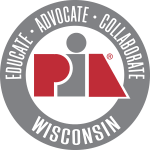To License Your Agency, or to Not License Your Agency – That Is the Question

Wisconsin is unique in that it is one of only five states that DOES NOT require agencies to obtain a business entity license to transact business in the state. The authority to transact insurance business in Wisconsin lies with the Designated Responsible Producer (DRLP) and the lines of authority that they hold, rather than a licensed business entity.
Since Wisconsin does not require it, there are many agencies in Wisconsin that do not have a business entity license and may believe that they do not need one if they are only doing business within the state. Agencies that do have a business entity license, usually have one because they were required to get one to conduct business in another state.
In the past few years, the question of whether Wisconsin agencies should get a business entity license has come up several times. Though it is not required in Wisconsin, regulations at both the state and federal level have used the business entity license as a criterion for qualifying whether an agency is subject to a regulation or exempt from it. This has led to confusion for some and has highlighted some important considerations that agencies should examine in deciding whether or not to get licensed going forward.
Agencies with a Business Entity License Are Exempt from the Corporate Transparency Act
The Corporate Transparency Act (CTA) went into effect January 1st of 2024 and is aimed at increasing transparency in ownership structures to combat money laundering and other illegal activities. This act mandates that “reporting companies” (corporations, LLCs, or other entities created by filing with a Secretary of Sate or similar office) must file a report with the Financial Crimes Enforcement Network (FinCEN) on their ownership information by the end of 2024 unless they qualify for one of 23 exemptions.
Exemption #13 applies to State Licensed Insurance Producers – any entity that (i) is an insurance producer that is authorized by a state and subject to supervision by the insurance commissioner or a similar official or agency of a state, and (ii) has an operating presence at a physical office within the U.S.
Since Wisconsin does not require a business entity license, there has been some discussion on whether or not agencies without licenses will fit that exemption. Read this article by Axley Attorneys for more information.
PIA is currently working to get clarification on whether Wisconsin agencies without a business entity license still fit this exemption, as the entities are arguably under the oversight of the Office of the Commissioner of Insurance regardless of whether or not they have that additional license. In the meantime, it would be prudent for agencies to either get licensed to ensure they fit the exemption by the end of the year – OR they can click here to file their benefit ownership information with FinCEN to satisfy the new requirement.
ATTENTION! As of December 3rd, 2024 the U.S. District Court for the Eastern District of Texas issued a preliminary injunction against the enforcement of the CTA. Click here to learn more!
Agencies with a Business Entity License Must File Annual Cybersecurity Certification
As you likely already know, 2021 Wisconsin Act 73 added regulations for insurance data security in Wisconsin in compliance with the NAIC Model that have now been in effect for the past few years. One of the requirements of that Act is that entities with a business entity license must complete an annual certification that they are following the information security program requirements of the act OR that certifies that they are exempt from that requirement. Any agency with a business entity license must file that annual certification between January and March 1st every year starting in 2023.
If your agency gets a business entity license, you must file this report annually – but it is quick and easy to do. PIA sends out reminders to our members about filing this certification that takes less than five minutes to complete. Learn more about the annual certification and cybersecurity requirements here.
FEMA Requires a Business Entity License/NPN on NFIP Policies
For policies with an effective date of January 1, 2024 or later, the Federal Emergency Management Agency (FEMA) requires new and renewing National Flood Insurance Program (NFIP) policies to include both the agent National Producer Number (NPN) NPN and an agency NPN. Thought FEMA had previously assured PIA that in 2024 NFIP policies would not be invalidated or non-renewed because an NPN was mission, they have declared it as a requirement. Going forward agents should ensure that they are using both the agent NPN and agency NPN on their policies/applications.
An agency should obtain a business entity license from Wisconsin OCI in order to receive an agency NPN to include on the policies.
Business Entity License/NPN Required for FEMA’s Direct to Consumer Agency Registry
Despite PIA raising concerns over FEMA’s plans to move forward with a Direct-to-Consumer platform for the National Flood Insurance Program, they have officially launched their Direct 2 Consumer Quoting Tool as of November 18th, 2024. This online platform will quote consumers online for flood and then connect them with a local agency that can write the policy.
Agencies that wish to be included on the agency registry for consumers to be directed to must have an agency NPN to sign up. Click here to sign up for the registry.
So, should you get your agency licensed? Well….
You should if you:
- Participate in the NFIP
- Want to do business outside of Wisconsin
- Want to ensure your Corporate Transparency Act Exemption rather than file
If your agency becomes licensed, it will be subject to:
- A $100 initial license fee
- A biannual $35 renewal fee
- Act 73 Annual Cybersecurity Certification Requirement
If would like to pursue getting a business entity license for your agency, click the link below to learn more via OCI.
If you choose not to get a business entity license, click the link below to file ownership information for your agency to comply with the requirements of the Corporate Transparency Act by 12/31/2024. Attention! The CTA Enforcement has been stalled by a preliminary injunction. Click here to learn more!
Questions about these considerations? Contact Natalie at nwhite@piaw.org.
